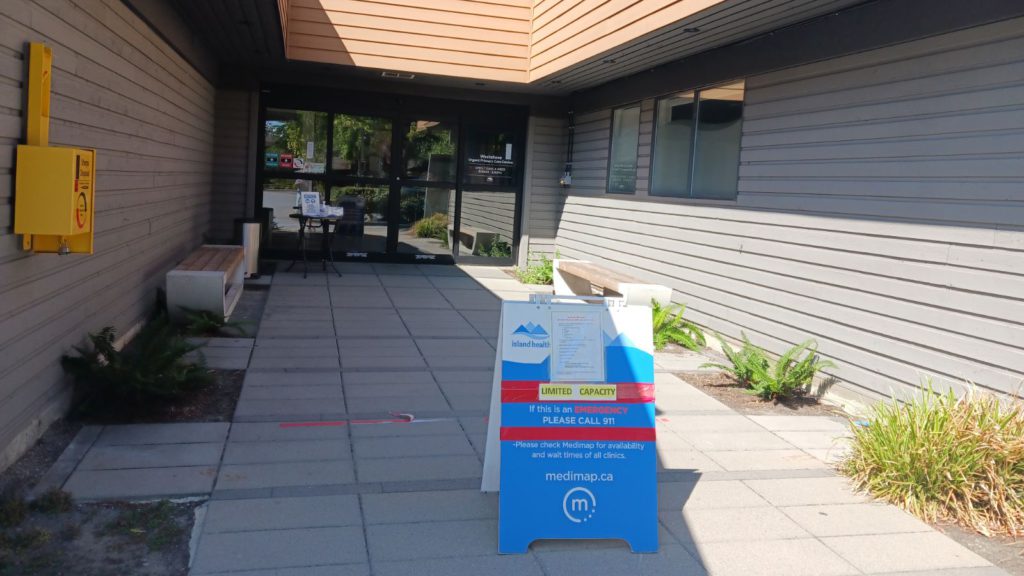
It’s a story that many across B.C. can relate to — frustration and barriers to accessing health care when it’s needed.
Ashton McFarland recently experienced this frustration this week when trying to find a doctor to see her four-year-old daughter with an eye infection.
“We don’t have a family doctor, so I called the nurses line, they recommended to go into an emergency, but it just didn’t seem like it was an emergency, so I went to urgent care on Monday morning,” McFarland said, noting she then tried her luck at the West Shore Urgent and Primary Care Centre.
“My dad actually lined up for me, so he got there at 6:45, and he was like the eighth person in line. And at eight o’clock, the nurse said, ‘Sorry, we only have one doctor, and we can only take eight people,’ and there was like a lineup of like 30 people.”
The nurse then went down and triaged the people in line and took the eight people whose needs were the greatest, and McFarland’s daughter did not make the cut.
She was told to try calling around to see if another clinic had room, and none of them did.
“I cried. I was just frustrated, because when we talked to the nurses line, or we even spoke to a doctor with 811, they were like, ‘she needs to get antibiotics as soon as you can,'” McFarland said. “So it was obviously really frustrating as a parent to be told that I couldn’t get that on that day.”
Not wanting to clog up the emergency room, or be faced with the long waits at an emergency room with a four-year-old, she tried again at the same UPCC the next day. Luckily, the next day she was able to be seen but had to wait for hours with her daughter.
McFarland says she knows the situation wasn’t the worst, but she was frustrated and felt like she was stuck between a rock and a hard place wanting to get her daughter’s eye infection treated but not clog up an already overwhelmed system.
“I think there needs to be a better system for urgent care. I don’t know if there’s a way to book appointments instead of standing there for so long,” she said. Because fortunately for me, I’m off right now, so I had the time to wait there, but if you don’t, there needs to be something else that can be done.”
CHEK News requested interviews with Island Health and the Ministry of Health. Neither made a spokesperson available, but sent written statements instead.
Island Health’s statement said it’s unclear why McFarland was told this, as 30 patients were seen on the Monday she visited, and the West Shore UPCC has averaged 45 patients per day over the past month.
“Staffing levels at the WUPCC vary day to day. Our physician partners adjust their schedules daily to optimize coverage. At times there may be one physician on shift,” Island Health’s statement says.
“Health human resources continue to be a challenge for all involved in the delivery of health care. The challenges being experienced here within Island Health are not unique to our health authority or region. They are being experienced throughout the province, country and beyond.”
The Ministry of Health’s statement says they understand the frustration people experience when trying to access primary care services, and the government is taking steps to address it.
“Most recently, on July 5, the Ministry of Health announced the expansion of the Health Connect Registry to better connect care providers to the people who need them,” the statement says.
“As of March 2023, funding has been committed for more than 2,240 new full-time equivalent (FTE) health-care workers to support team-based care through various initiatives, and about 1,500 of these FTEs have now been recruited, with more to come as the Province continues to expand team-based primary care.”
Over the next two years, the government plans to establish more than 60 primary care networks across the province, open 20 more UPCCs, and open more nurse practitioner primary care clinics, First Nations primary care clinics, and community health centres.
“We’ve also introduced the New to Practice Incentives Program in June 2022 for early career or ‘new to B.C.’ family physicians who choose to work in longitudinal family practice. To date, 156 physicians have signed onto the program,” the statement says.
“In addition, the Ministry of Health collaborated with Doctors of BC in Oct. 2022 to provide $118 million in short-term stabilization payments to primary care clinics and providers while developing the new longitudinal family physician payment model. More than 1,230 clinics received this stabilization funding.”




